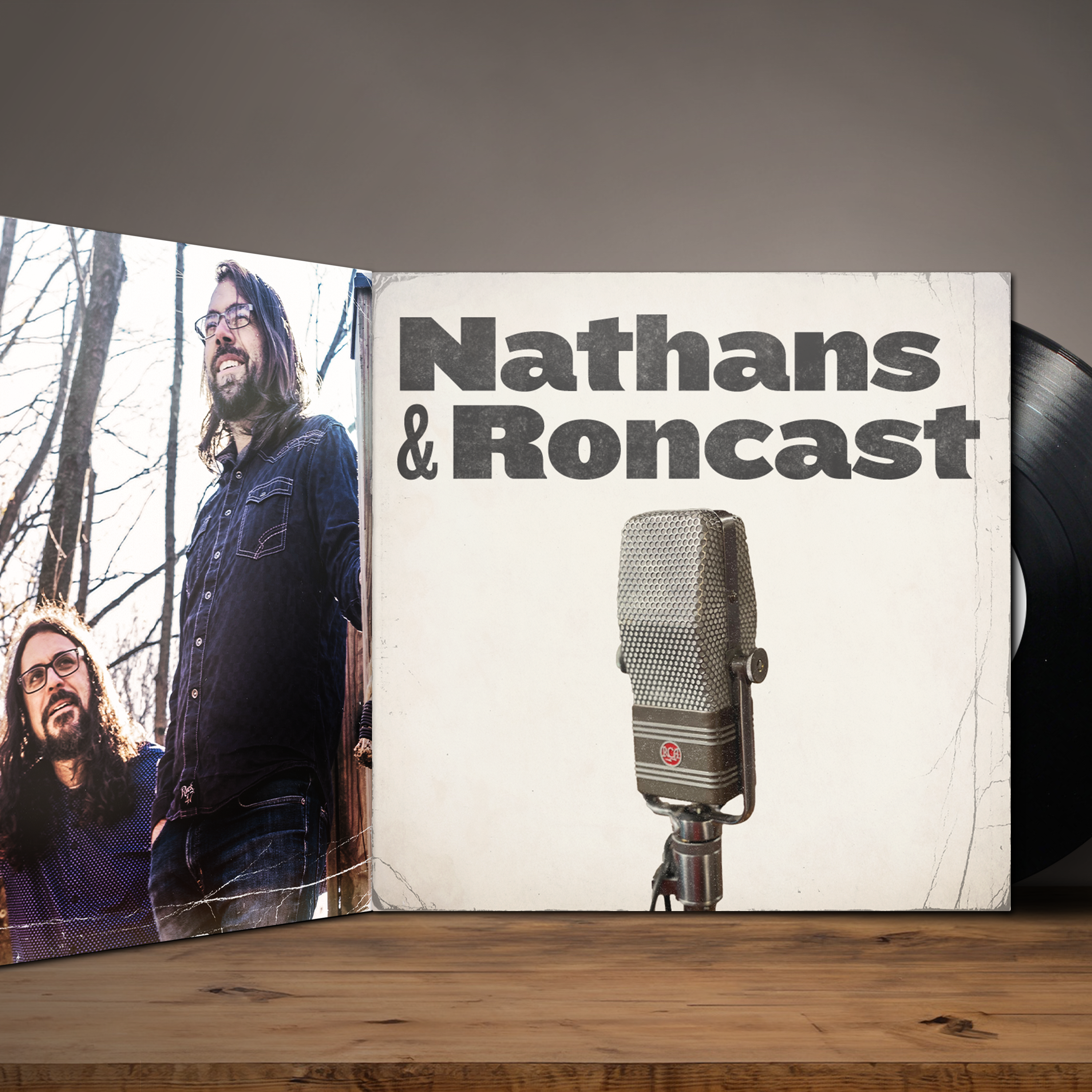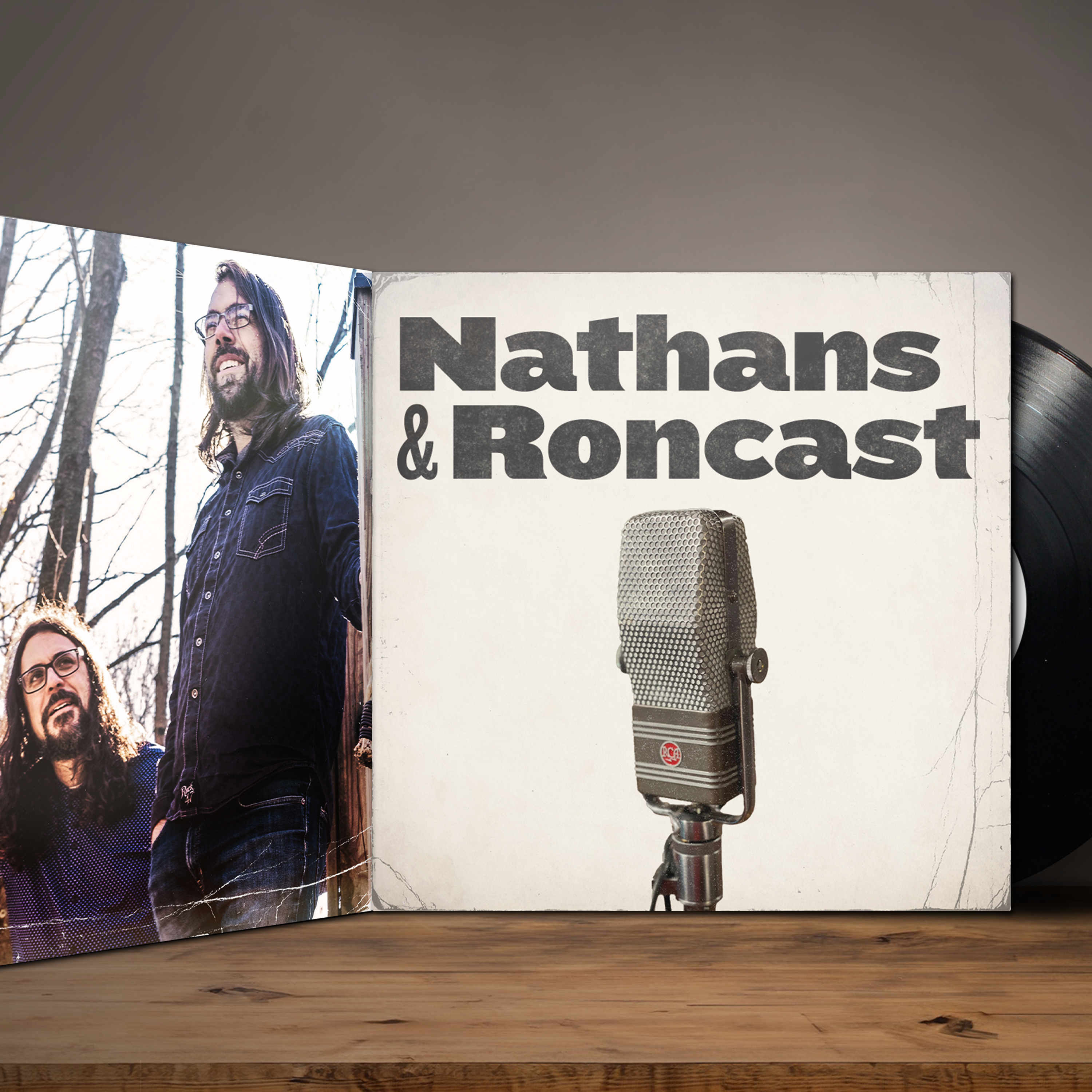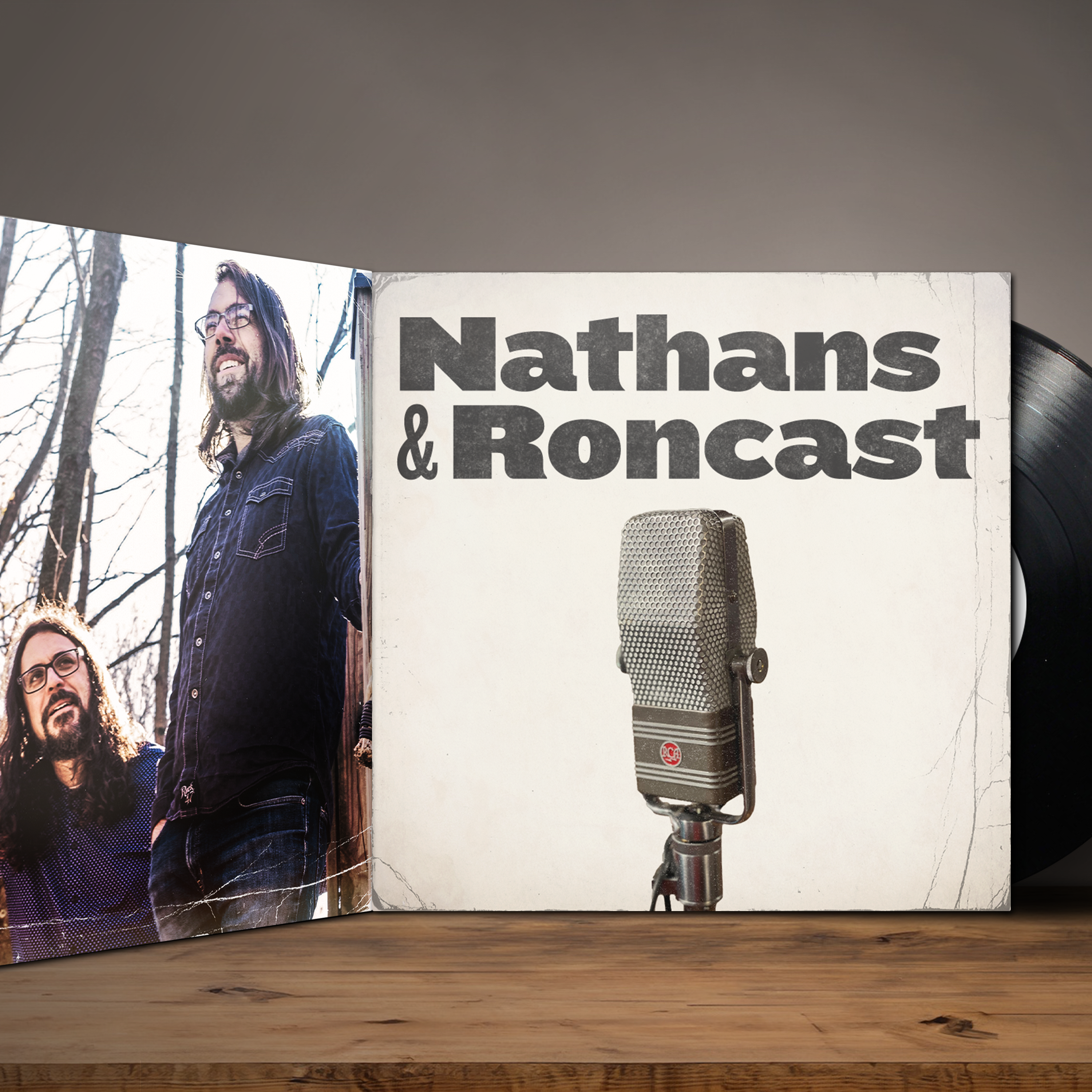Episode Transcript
[00:00:14] Speaker A: Hey, Aaron, how are you doing?
[00:00:15] Speaker B: Okay. Michael, how are you doing?
[00:00:17] Speaker A: Great. You're listening to the Nathans and Roncast, and this is a very special mini episode from the road. We are in Rockport, Massachusetts.
[00:00:26] Speaker B: We're still in Rockport, Massachusetts, Aaron.
[00:00:28] Speaker A: I figured we could have, like, a miniature. You're so great. No, you're so great. Festival with a mini episode. And I thought it'd be kind of fun to maybe talk about each other's music, because it's a little more egotistical to talk about our own music.
[00:00:43] Speaker B: Okay, well, laying on thick, bro.
[00:00:45] Speaker A: Okay. So my first offering was gonna be your song, doing the best I can. And it was one of the early songs we learned as a duo. Started performing 1011 years ago. And I believe your son Charlie had recently been born.
[00:01:02] Speaker B: He had been.
[00:01:03] Speaker A: So you knew about parenthood, but you also were going to have a second kid in that world, and your time was already stretched. And then it got stretched more. And the song really expresses that in a way that me, a non parent, can feel that stress. And so the song's great. You know, it's doing the best I can. You know you only have two hands, right? You know, you can only. There's even boiling a bink in there, so we'll play it at the end. But one of the things that I think is really cool about it is that you modulate up a half step. I call it a Barry Manilow modulation. Us, music theory trained classical musicians, we're told that that's what a direct modulation is. You say, oh, that's a Barry Manilow modulation, because it surprises you. And so you have this break, and all of a sudden, you're scrambling to move your capo up a fret. And good thing you have a squeeze capo, because you can do it with one hand, and then, bam, you're a half step higher. And so we have this driving thing, and then you just kick it up a gear. And to me, I was like, oh, my.
Why did I never think of moving my capo up in the middle of the song?
[00:02:15] Speaker B: Because you played cello.
[00:02:17] Speaker A: That's true. That's true. But little. Well, people might know. But if you hear our recordings, there's a lot of Michael Ronstadt playing guitar.
[00:02:24] Speaker B: There is.
[00:02:26] Speaker A: But I kind of try to just, you know, be a tastemaker and throw it in there. And I've been playing guitar for 29 years, in cello for 31. But I have a degree in cello, so guitar, by default, is the less desired in my career. But I like them both, so. So it's wonderful. Aaron, what inspired you to do that capo move? Because. Was that you?
[00:02:48] Speaker B: Was it? Well, that was. I stole that from David Wilcox.
[00:02:51] Speaker A: Oh, okay.
[00:02:52] Speaker B: Who I actually once opened for David Wilcox, and I did that move in front of him, and I think I saw his eyebrows move just a little bit, but I never claimed to have made that up.
It's when you don't have an intuitive sense of how to modulate on the chords themselves, especially when you're in drop d.
It's a quick, easy hack, and it looks. Yeah, I always get a rise out of people when I do that.
[00:03:28] Speaker A: Yeah, I think you play up the slight panic and like, oh, no, I better do this now. But you play it in a way that you're just like. And then people who don't notice what musicians are doing, because maybe they don't play an instrument, they probably just go on with their day. But, you know, who are the musicians in the room when you look around?
I am curious if by chance there are any Michael Ronstadt songs that grabbed your ear maybe early on or anytime.
[00:03:59] Speaker B: Well, I mean, early on it would have been corners. I think that was the first song that we ever recorded for an appetizer, is what we called it.
[00:04:09] Speaker A: Yeah. In 2012, we did a musical appetizer for the Northeast Regional Folk alliance conference that we went to, and we might even release one of the tracks from that at some point soon. But basically, we needed something, so I grabbed a cheap microphone that I had to mic up my cello. It was not a cheap microphone, but that's all I had to. And we recorded all the parts and sent it to my brother, Petey Ronstadt, to mix, and we had the appetizer. Corners was a go to song for me because it was kind of like the most normal song I had.
[00:04:41] Speaker B: Well, that's right. But that's the reason why that's not the song that I have picked for this moment, because I thought, you know, that I think you were just kind of playing it safe for me at that moment, trying to draw me in with how normal you were, and then you let your freak flag fly, and I love you for it. So the song I want to mention is not an old song. It's just 1 minute, which we've been playing lately at my request.
And I recently looked at the video we did for that during the pandemic. And those of you at home, if you want to fire that up on YouTube, we put things in the microwave.
[00:05:26] Speaker A: And, oh, that's one of my favorite moments. We reverse engineer we cook food backwards. It's great.
You should just check it out.
[00:05:37] Speaker B: Yeah. But in any event, the song itself I really liked. You wrote that during February album writing month one year. And it really grabbed me. And I actually, I think was the one who suggested that we do it to not even a click track, but a drum loop or something.
[00:05:54] Speaker A: Oh, that's right. Yeah.
[00:05:56] Speaker B: And it sounded almost mechanical. And I love how Michael is able to harness everyday frustrations and just like doing the best I can, which is about the frustration of trying to continue to exist in a world where you're suddenly stretched very thin.
Michael is writing about the frustration of being in a cell lot at an airport and waiting for somebody's flight to land, and that you only have a certain amount of time in that lot and then they shoo you out. And that Michael tries to bribe the attendant, and the attendant's like, you can't bribe me, get out.
[00:06:38] Speaker A: It doesn't work. It never works.
[00:06:40] Speaker B: Right. So, I mean, the subject matter is interesting. The words are fun, the melody is fun. But as in a lot of your songs, there's a little kind of middle age that doesn't has a different feel than the rest of the song. Okay, so, I mean, a lot of your songs have that little jagged edge in this one. I like it because it's.
It's so blatant, it's so funny. It's so rapid. The rapid fire words that you're taking this moment of frustration and thinking about everything bad in the world in this moment. They're the ones that are the ones that ignore humans.
And then you just kind of go back to.
Back to waiting and just.
I forget how the song actually ends. Does the flight come in?
[00:07:41] Speaker A: It comes in and you get shooed away, right? One, you know, just 1 minute.
[00:07:46] Speaker B: Just one before you.
[00:07:48] Speaker A: Before you. You're here and then, you know. But they tell me to go.
[00:07:52] Speaker B: You know, they tell me to go, right? So the person arrives, you can probably even see them, they're coming. And you tell the guy, just 1 minute, just 1 minute. And they're like, no. So it's funny, but almost anybody can identify with that. And so that's kind of. That's where the magic is, where humor meets recognition.
[00:08:13] Speaker A: Aaron, you've surprised me. Thank you. Thank you for the kind words.
[00:08:17] Speaker B: You constantly surprised me.
[00:08:19] Speaker A: Well, you know, consistency is not my middle name, is what I like to say.
[00:08:24] Speaker B: It's Gilbert.
[00:08:25] Speaker A: It's Gilbert. Yeah. So basically, we're going to play the songs for you. So we'll start with doing the best I can.
[00:08:31] Speaker B: And then we'll do just 1 minute.
[00:08:32] Speaker A: Yeah. So sit back, enjoy the ride. We've got more great episodes coming next week. We'll have Burr settles and February album writing month. Yeah. And you introduced February album writing month last week. And it was, you know, if you don't know about it and you like to write songs or poetry or instrumentals, it's a great community of folks, and it's really positive and encouraging without being as social media driven like some of the other ones.
The interview, he talks about how there were some things he could have done, like having a like button, but he still keeps it. So you write a comment. He wants to have people engage a little more. And I thought that was kind of a neat little factor that I never thought about.
[00:09:18] Speaker B: Yes. So let's play the music.
[00:09:20] Speaker A: Okay. One, two, three, go.
[00:09:23] Speaker C: I used to put on fancy clothes I used to paint the town now Timothy is ringing me I don't see you around well, I've got this child strapped to my chest I've still got on my daytime vest and after sundown I got nothing left I doing the best I can I only have two hands everyone's expecting me to be the way I used to be oh, I down on the floor to play trying to get through the day I'm asking you to understand I'm doing the best I can the doctor's bills are piling up there's groceries on the floor the laundry pile is getting high there's someone at the door can I have a minute of your time? As if that minute's even mine so take a hint and let me mind the store I doin the best I can I only have two hands everyone's expecting me to be the way I used to be oh, I'm down on the floor to play trying to get through the day I'm asking you to understand I'm doing the best I twinkle, twinkle, telephone I make believe there's no one home mow the lawn, fix the sink, clean the bottle, boil the bin make sure that the kids are paid the paper boy wants to be paid. Crack of dawn, the morning gone, a miracle, it all gets done I'm sleepwalking through my days down in a deep haze there's the baby, please don't wake it there's the wine glass, please don't break it I doin the best I can I only have two hands man, the world sure makes my head spin when it says you gotta squeeze me in I'm down on the floor to play I'm taking it day by day. I'm asking you to understand I'm doing the best I can doing the best I can I'm doing the best I can.
[00:12:49] Speaker D: Just 1 minute until you show just 1 minute don't they know.
[00:13:06] Speaker C: But they.
[00:13:07] Speaker D: Tell me that I got 30 minutes to go they tell me that I got 30 minutes to go in the cell lot his cell gears turn in my mind.
In the cellar sleeping off the tile.
[00:13:36] Speaker C: Sleeping off the tile you tell me.
[00:13:42] Speaker D: That I gotta wait another five.
You tell me that you need just a little more time.
Just 1 minute just 1 minute until you're here just 1 minute just 1 minute I know you care give 1 minute give 1 minute of your time.
They tell me that I gotta go home they look fast, push me in the road.
They're the ones who don't see us. They're the ones who run the globe. They're the ones who sniff the lines. They're the ones who have the gold. They're the ones who ignore humans.
[00:14:47] Speaker C: They're the ones who choose a soul.
[00:14:48] Speaker D: They're the ones who have no limits. They're the ones who have no holds.
Tip them 20.
[00:14:57] Speaker B: Tip them 20.
[00:14:58] Speaker D: They won't take the bribe.
[00:15:01] Speaker B: They won't take the bribe.
[00:15:03] Speaker D: Tip them plenty. Tip them plenty and they don't seem alive. They don't seem alive just 1 minute.
[00:15:15] Speaker C: Until you show.
[00:15:21] Speaker D: Just 1 minute but they tell tell me to go just 1 minute until you show just 1 minute but they tell me to go tell me to continue shovel.


